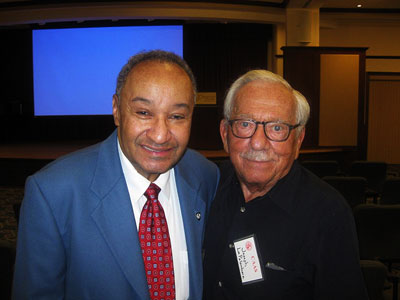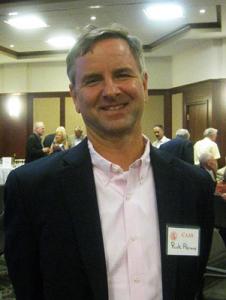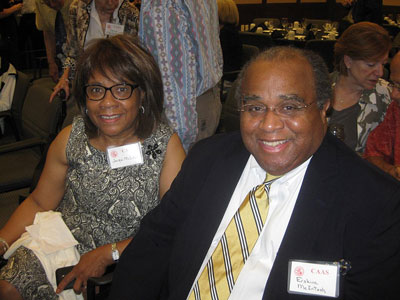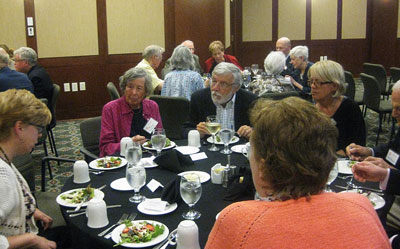Minutes of CAAS Meeting 1452: Joseph LaPalombara Yale University Professor Emeritus. Topic was “Democracy at Home and Abroad.”

Gregory Tignor, President of CAAS, convened the meeting at 5:30. He introduced the following new members: Erskine McIntosh, Michael Bracken, Rick Abrams, and Chris Walsh.
The speaker was introduced: Joseph LaPalombara, is the Arnold Wolfers Professor of Political Science and Management Emeritus, and a Senior Research Scholar in the Center for Comparative Research. He is a member of the American and the Connecticut Academies of Arts and Sciences, and has been awarded the Medals of Honor by the Presidency of the Italian Republic and by the Italian Constitutional Court.
Professor LaPalombara started by quoting two different men. The first stated: Only thing we have to fear is fear itself (FDR). The second: The forces of good and evil are massed and armed and opposed as rarely before in history. (Dwight Eisenhower).
 We are a long way from the self-congratulatory speeches that we’ve heard in the past. There were reasons for such self -congratulations: We had won WW2, turned Germany and Japan into democracies. The Evil Empire as Reagan called it began to break up. Gorbachev suggested the maybe Russia might turn to democracy. We felt Ukraine would develop as a democracy. Even in Europe, Spain, and Greece became more democratic. In South America, Brazil, Chile became more democratic. But things have changed in Ukraine, Russia, Turkey, and Iraq (one of the wars we’ve lost).
We are a long way from the self-congratulatory speeches that we’ve heard in the past. There were reasons for such self -congratulations: We had won WW2, turned Germany and Japan into democracies. The Evil Empire as Reagan called it began to break up. Gorbachev suggested the maybe Russia might turn to democracy. We felt Ukraine would develop as a democracy. Even in Europe, Spain, and Greece became more democratic. In South America, Brazil, Chile became more democratic. But things have changed in Ukraine, Russia, Turkey, and Iraq (one of the wars we’ve lost).
Our worldwide luster has been dimmed. We sent Bremer to Iraq with 8 billion in cash to use creatively to develop democracy. The temptation to misuse the cash was overpowering. The money can’t be traced. There is no hard evidence of good that this money did.
 There are other problem areas. Democracy in Italy is uncertain. In Germany, Merkel is in trouble. Her approval dropped from 80 percent to 47 percent largely over her immigration policy for Europe. Brexit probably won’t be a positive development in the long run.
There are other problem areas. Democracy in Italy is uncertain. In Germany, Merkel is in trouble. Her approval dropped from 80 percent to 47 percent largely over her immigration policy for Europe. Brexit probably won’t be a positive development in the long run.
Freedom House has been worrying about democracy for years and has invited academics to write about democracies. A friend at Stanford has argued that democracy is rising around the world. He argues that polling reveals this.
LaPalombara argues otherwise. He feels we have an astonishing increase in executive power. FDR was wrong. We had plenty to fear in 1933. There was near failure of capitalism. What FDR accomplished was a survival of capitalism through the New Deal. We defeated McCarthyism.
But, we’ve done poorly since 9/11. There is a decline in trust in government and politicians and political institution. The public approval of Congress hovers around 30 percent. There is greater public conviction of the idea that in order to prosper an authoritarian ruler is required. Look at China that has been developing rapidly. It took the US 30 years to double its GDP (gross domestic product). China has done it in a relatively short period.
However, generality about democracy today is dangerous. A lady (Raggi) is mayor of Rome, Le Pen will be a major figure in France. There is a diffuse populist surge in many countries including the US.
Nevertheless, we in America have permitted torture to be used and accepted. Many believe xenophobia is not such a bad idea. Most of all, we Americans have gone along with the idea that the NSA is okay in what it is doing. Americans are too free to accept the use of drones. The book A War Like No Other by Owen Fiss really worries about drones and the killing of American citizens without trial. It has happened far too frequently according to some journal reports.
 What is the cause? The Economist in its weekly report published an analysis on Sept 2, 2016. It emphasized the politics of anger. Cities are degenerating in every sense. Deferred maintenance, too much migration, too much unemployment. The Economist found the dreams of many people have been shattered. GDP up 14%. Household income went up 2%. The Economist thinks liberalism is in trouble.
What is the cause? The Economist in its weekly report published an analysis on Sept 2, 2016. It emphasized the politics of anger. Cities are degenerating in every sense. Deferred maintenance, too much migration, too much unemployment. The Economist found the dreams of many people have been shattered. GDP up 14%. Household income went up 2%. The Economist thinks liberalism is in trouble.
Inequality is the most likely cause of angry people in democracies. The upper 10% are taking home 90% of the new income. We, as a country, are number one among developed countries in terms of inequality.
The poverty rate has skyrocketed in the last decade. Poverty rate for young Black males is above 14% in New Haven. Both party primaries were dominated by anger. This is a nightmare situation. The speaker’s personal nightmare is recalling the Weimar election fearing something like this could happen.
LaPalombara wrote to Economist asking why no one is attacking lies that are so common in the media. Exaggerations and evasions are commonplace and are not challenged.
The speaker concluded by saying that democracy is imperiled in in a number of places including Greece and perhaps Spain. He fears a heavy voter turnout will not be good for democracy in America. His wife thinks he should have taken up second citizenship in Italy when he had the opportunity.
Comments and Speaker Replies
Comment: Hitler was never elected.
Speaker Reply: National Socialists got more votes; hence their leader (Hitler) was appointed Chancellor. Both Italy and Germany believed that their courts would provide security for democracy. They were wrong.
Comment: Hitler’s party had a plurality and this allowed the Nazi party to declare a national emergency. Worried that capitalism is going to become unfettered.
Speaker Reply: Emergency powers are dangerous because plans don’t often plan for termination of emergency powers.
Comment: Real issue is corporations are taking over the world, run by people who are not elected, but are given enormous power. Our wars have been to support corporations.
Speaker Reply: I’m not in full agreement. It is a fallacy that the person in charge is always running things. Consider Exxon: the head of the company didn’t know what was going on with Valdez episode. Consider Enron after three years Fortune magazine was mistaken about Enron as a most innovative company. Stockholders are often uninformed. Some, not all, CEOs are dictatorial. Giving from the very rich to help the poor has worked well in this country’s history. Might be worth a try.
End of meeting. Dinner was served.
Minutes and photos by Monica Aspianto